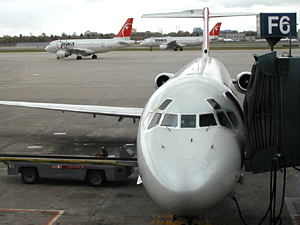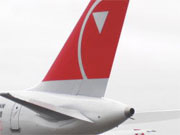 |
| Northwest declared bankruptcy about a month earlier than many had expected. The timing of the decision likely stemmed from the need to preserve cash and avoid looming bills. But some question whether the airline had "the willingness" to find a non-bankruptcy solution. (MPR File Photo) |
St. Paul, Minn. — If you asked airline industry analysts earlier this month when they expected Northwest might file for bankruptcy, the most common answer was something like, "shortly before Oct. 17." After that date, changes to U.S. bankruptcy law would have made the process less attractive to the company.
Instead, Northwest filed more than a month ahead of that deadline -- making history by filing the same day as another major airline, Delta. Northwest CEO Doug Steenland said on a conference call that evening that the clock had simply run out.
"We had developed a plan to restructure Northwest outside the Chapter 11 process and had been implementing that plan," Steenland said. "Unfortunately skyrocketing fuel costs, among other factors, caused time to run out and caused us to seek what we did this afternoon."
In bankruptcy filings, Northwest repeated the same litany of troubles that for months had constituted its argument for concessions from labor groups: competition from low-cost carriers, the highest labor costs in the industry, huge pension payments coming due, and record-high fuel costs. The price of jet fuel soared to new levels after Hurricane Katrina knocked out refining capacity in the southern U.S.
None of this explains why -- on that particular day -- time had run out. Michael Miller, with the aviation consultancy Velocity Group, thinks the specific timing had more to do with tens of millions of dollars in bills that bankruptcy would put on hold, including $18 million owed to one of its regional airline partners.
"Northwest faced a number of payments, including one to Mesaba (Airlines) and to some aircraft makers," Miller says. "They needed to make a decision about whether to make those payments or not, and I have a feeling that was driving the decision much more than we know."
According to the Northwest pilots union, the Air Line Pilots Association, the airline also faced looming pension payments in September and October. Avoiding bills helped preserve the cash Northwest says it needs to restructure. The airline entered bankruptcy with about $1.5 billion in cash -- down from more than $2 billion in June.
ALPA has a representative who sits on the Northwest board of directors. Union spokesman Hal Myers says cash was critical to the bankruptcy timing.
"Rather than go in (to bankruptcy) in a weakened position later, the choice was made to go in at a time in a stronger cash position, which might increase the likelihood of a successful emergence at some future point," Myers says.
Myers says talks between pilots and the company were active and moving ahead just two days before the filing. But he says the union was not surprised, and had actually highlighted mid-September as a pressure point on the company, largely because of the large number of payments it would face at that time.
Some speculate Northwest's filing for bankruptcy on the same day as Delta Airlines was just too strong a coincidence to actually be one at all. News of Delta's filing had leaked earlier in the week.
Rich Gritta, a professor of finance and transportation at the University of Portland in Oregon, says Northwest didn't want to be the only carrier still struggling to cut costs outside of bankruptcy.
"You've got United already in there, you've got USAir, and you've got Delta. The question is, if everybody else is in there and you ain't, it creates problems for you planning and meeting the competition in terms of fares," Gritta says.
Gritta is also among those who believe that while Northwest executives talked a strong game about staying out of bankruptcy, Chapter 11 was always the most likely outcome.
"You'd have to be a fly on the wall to know," Gritta says. "But my suspicion is that they've been planning for this for a year and a half, so it was more calculated than it (looked)."
The striking mechanics union at Northwest agrees, but is less diplomatic. Union spokesman Steve MacFarlane says Northwest's hard-line approach in contract talks made it clear the company ultimately intended to impose its will on unions in bankruptcy, rather than reach a deal.
"This is the miracle tool of the decade, when you consider that there is really no downside to bankruptcy," MacFarlane says. "It used to be the symbol of a company that failed. Today it is just another tool in the toolbox executives are able to wield in order to get everything the company needs. And in the process, they wind up walking away in the end with millions of dollars."
MacFarlane says union members are incensed over one of the first orders of the bankruptcy judge in New York, which maintained Northwest's cash incentive programs for officers and managers of the company. Northwest told the court these could cost up to $20 million.
On the other hand, executives hold both stock and stock options that will likely be rendered worthless by the bankruptcy process.
The airline declined to discuss executive compensation or the bankruptcy filing beyond what has already appeared in court filings and public statements. In court filings, Northwest says its goal had always been to restructure without resorting to bankruptcy.
At least one major investment bank has lashed out at Northwest for jumping too quickly into Chapter 11. Analyst Douglas Runte of Morgan Stanley, in a research report the day after the filing, wrote that Northwest "had the opportunity to restructure out of bankruptcy...but not the willingness."
Just two weeks before, Runte had advised investors Northwest seemed likely to turn things around.
Northwest's bankruptcy filing on Sept. 14 forced Morgan Stanley and other optimists to admit -- a little earlier than expected -- that they were wrong.




